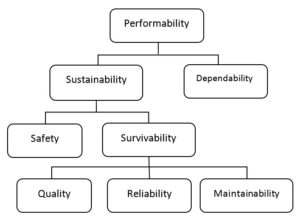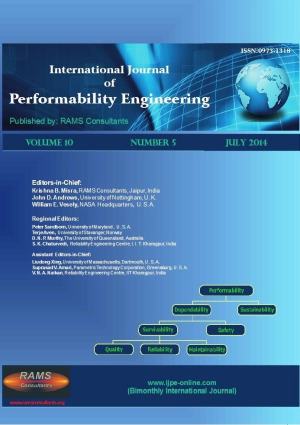International Journal of Performability Engineering
On August 13, 2015, an agreement was signed between RAMS Consultants, India and Totem Publisher Inc., U.S.A. transferring the ownership of IJPE to the new publisher.
Any communication regarding the Journal should be directed to IJPE Customer Service and not to Prof. K. B. Misra
The topics of interest include, but are not limited to:
- System (software and hardware) quality assurance
- Quality engineering and management
- Techniques and technologies for performance evaluation and improvement
- Risk perception and analysis
- Product design and optimization
Performability engineering is a concept introduced by Professor Krishna B Misra to the Engineering world. It is a holistic interdisciplinary approach to optimally engineer dependable and sustainable systems, products, and services. More about the scope of IJPE can be reviewed on the Journal’s website.

Concept of Performability was introduced by Prof. K. B. Misra
Following is an excerpt from the inaugural issue of IJPE in July 2005
Introduction to International Journal of Performability Engineering (IJPE)
When an aggregate attribute such as performability reflects a designer’s entire effort in achieving sustainability for a dependable product, we could call this effort as performability engineering, which in other words is meant to reflect the entire engineering effort of a producer to achieve the performability of a product, system or service. This concept has been appropriately depicted on the cover page of this journal. It may be emphasized here that the usual definition of dependability ignores the environmental consequences that accompany while creating products, systems and services and their truly optimal designs should not overlook to achieve their sustainability, economically.
In fact, performability engineering not only aims at producing products, systems and services that are dependable but involves developing economically viable and safe processes (clean production and clean technologies) that would entail minimal environmental pollution, require minimum quantities of raw material and energy and yield safe products of acceptable quality and reliability that can be disposed off at the end of their life without causing any adverse effects on the environment.
This would necessitate the efficient use of natural resources and the use of non-waste technologies which would ensure that all raw materials and energy are used in a most rational and integrated way to curb all kinds of wastages while maximizing the performance. Obviously, less material and energy consumption – either through dematerialization, reuse or recycle or through proper treatment (clean up technology) – would lead to a lesser degree of environmental degradation. Similarly, a better design would result in prolonging the lifespan of a product and hence would ensure less adverse effect on the environment over a given period of time. In other words, we must integrate the entire life cycle of activities of survivability with that of environmental lifecycle considerations to improve the product or system performance within the technological barriers with minimum cost.
At every stage of life-cycle of a product, be it extraction of material, manufacturing, use or disposal, energy and materials are required as inputs and emissions (gaseous, solid effluents or residues) are always associated which influence environmental health of our habitat. Unless we consider all these factors, we cannot call the design of products, systems and services truly optimal from engineering point of view. This would necessitate bringing synergetic interaction between the constituent areas of performability.
Necessity for IJPE
There is no single international journal at the moment that deals with this problem in this perspective. Neither the existing journals on the subject of survivability and safety ever deliberate the issues related to sustainability, nor do the journals on sustainability and related areas touch upon problems of survivability or safety. For instance, while designing for optimal survivability, internalization of environmental costs is never considered and vice versa. A truly optimal product design must balance out all these conflicting conditions imposed upon the product development while resorting to clean manufacturing processes. However, the basic platforms of addressing the inherent complex problems of this task would emerge from the perspectives of performance, environment and economics as these products shall have to be produced in a competitive world market.
It is therefore time that we stimulate the initiative and efforts of all those who are engaged in creating high performance, sustainable and economic products, in all its facets by providing a common forum and be a part of the impending revolution that is looming large on the technological horizon. This journal is primarily aimed at providing supportive interactions and linkages between these diverse areas and promotes the objective of designing, producing, operating and using sustainable and dependable products, systems and services.


